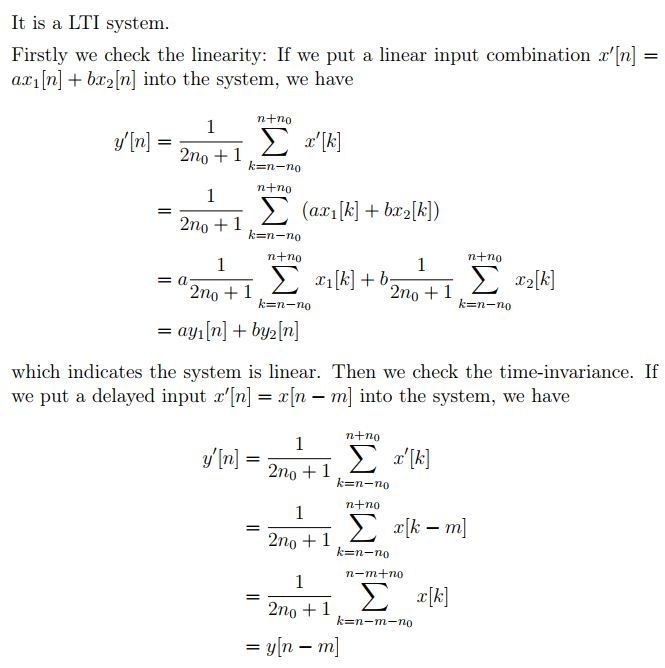Signal Processing Assignments 01
LTI systems?
\[ae_1(t)+be_2(t)\rightarrow ai_1(t)+bi_2(t)\tag{step 1: Linearity}\] \[e(t-t_0)\rightarrow i(t-t_0)\tag{step 2: Time Invariant}\]i.e. If $y[n]=\frac{1}{2n_0+1}\sum_{k=n-n_0}^{n+n_0}x[k]$ is a LTI system?

properties of Convolution
\[f(t)\ast g(t)=\int_{-\infty}^{+\infty}f(\tau)g(t-\tau)d\tau\tag{Def.}\] \[f(t)\ast g(t)=g(t)\ast f(t)\tag{Commutative law}\] \[f(t)\ast (g(t)+h(t))=f(t)\ast g(t)+f(t)\ast h(t)\tag{Distributive law}\] \[(f(t)\ast g(t))\ast h(t)=f(t)\ast (g(t)\ast h(t))\tag{Associative law}\] \[f(t)\ast\delta(t-t_0)=f(t-t_0)\tag{with Dirac Function}\] \[\begin{cases} f(t)\ast g(t-t_0)=f(t-t_0)\ast g(t-t_0)\\ f(t-t_0)\ast g(t)=f(t-t_0)\ast g(t-t_0) \end{cases} \tag{Displacement characteristics}\] \[\begin{cases} a\cdot(f(t)\ast g(t))=(a\cdot f(t))\ast g(t)\\ a\cdot(f(t)\ast g(t))=f(t)\ast (a\cdot g(t))\\ \end{cases},~a\in\mathcal{R}-\{0\}\tag{scaling 1}\] \[(f(a\cdot\tau)\ast g(a\cdot\tau))(t)=\frac{1}{\vert a\vert}\cdot (f(\tau)\ast g(\tau))(a\ast t)\tag{scaling 2} % f(a\cdot t)\ast g(a\cdot t)=\frac{1}{\vert a\vert}\cdot f(t)\ast g(t), ~a\in\mathcal{R}-\{0\}\tag{scaling 2}\] \[\begin{cases} (f(t)\ast g(t))'=f(t)\ast g'(t)\\ (f(t)\ast g(t))'=f'(t)\ast g(t) \end{cases}\tag{Differential properties}\] \[f(t)\ast u(t)=\int_{-\infty}^tf(\tau)d\tau\tag{with unit step function}\] \[\int_{-\infty}^tf(\tau)\ast g(\tau)d\tau=[\int_{-\infty}^tf(\tau)d\tau]\ast g(t)\tag{integral property}\]some proofs
| The Main idea of the proofs for the former properties is using both the definition and the method of substitution. |
i.e. Displacement characteristics:
\[\begin{aligned} LHS&=[f(\tau)\ast g(\tau-t_0)](t)\\ &=[g(\tau-t_0)\ast f(\tau)](t)\\ &=\int g(\tau-t_0)f(t-\tau)d\tau\\ &=\int g(\epsilon)f(t-t_0-\epsilon)d\tau\\ &=[g(\epsilon)\ast f(\epsilon)](t-t_0)\\ &=f(t-t_0)\ast g(t-t_0) \end{aligned}\]